-
THE B-SIDE: ELSA DORFMAN'S PORTRAIT PHOTOGRAPHY (Errol Morris 2016)
ERROL MORRIS: THE B-SIDE: ELSA DORFMAN'S PORTRAIT PHOTOGRAPHY (2016)
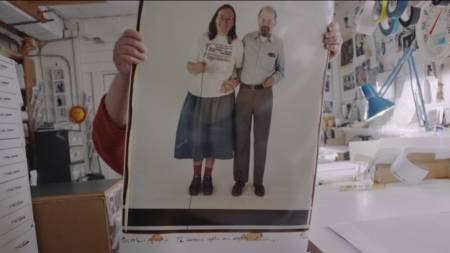
ELSA DORFMAN SHOWS A 20X40 OF HERSELF WITH GINSBERG IN THE B-SIDE
A casual portrait
Elsa Dorfman is an old lady of 79 and also a friend of Mr. Morris. They both live in Cambridge, Massachusetts. Of this film, an unpretentious gesture of a 25-year friendship, Morris said, in a NYFF Q&A, that with a subject like her "you just have to get out of the way," and for good or ill that is pretty much what he did. He lets Elsa ramble on, filming her in her garage-archive at a large drafting desk pulling out one photograph after another from ranks of flat files containing nearly fifty years of work, or decades anyway. Morris adds some illustrative material, but mostly his film is her talking and her work. So presented, it turns out to be thin material, and the 76 minutes feel like more than enough.
Two things are fascinating: a network of notables, artistic and intellectual, and a unique large view camera "instant" photographic format, doggedly pursued. Elsa, who married a civil rights lawyer, knew a lot of Beat era writers and poets as well as some rock stars and Harvard big shots,and was a good friend of Allen Ginsberg from his most creative period up to the end, and made many portraits of him, including huge nude ones. One of Morris' best ancillary moments is two phone messages from Ginsberg and a friend when he was about to die. The other thing is Elsa's long and faithful association with the big format Polaroid cameras, the 20x24 and the more rare 40x80, though she points out that to Polaroid she was no one special: other photographers got preferential access to the special cameras. It was only by persistence and renting a large space that she was able to have regular access to one of the cameras and use it to shoot paid portraits. Surely Richard Avedon's use of large format view camera portraits in his In the American West series blows Elsa's big Polaroid efforts away for artistry and drama, though he probably could never have achieved her funky down home charm either, and her work, though unpretentious, has a consistent positivity and warmth Avedon's attention-getting oddities lack. As she explains, she doesn't do unhappy people. Her arbitrary, thrown-together shots, however, despite their charm, don't set her with the great, penetrating artists of photographic portraiture.
Elsa's rambles provide a somewhat sketchy picture of her life, a job with Grove Press in the sixties, and other connections after she left New York that brought her in touch with Beats and other notables. Details, lacking here, are partly filled in by her Wikipedia bio, which says she organized a "Paterson Society" that gathered Beats and kept up a correspondence with them afterwards "as they traveled the world." Maybe she met more of them through Ginsberg, or even her husband; who knows? She managed to photograph Bob Dylan at a concert when others were excluded. She also is shown selling her (smaller) photos on the street from a cart; apparently her husband's civil rights expertise helped her evoke her Second Amendment rights against police harassment when doing this.
As with all photography just as a record of people and their times it is interesting to see Elsa's photographs, even the "B-side" ones, which she explains are those out of two big Polaroids made that clients chose not to keep, and left with her. A more efficient presentation might have included a panorama of them, carefully photographed; seeing Elsa manhandle and pull them out randomly adds little but a sense that there are many and she has not seen them for a long time. Learning more of what she has to tell would have taken a lot more interviews, edited into the best moments, and including a more complete picture of her life and of her relationships with the notables.
At the New York Film Festival presentation of the film, a special surprise was an appearance of Dan Stern, President of the Film Society of Lincoln Center, with one of the 20x40 Polaroid cameras he arranged the Society to buy, along with a stock of the necessary film and other supplies that Polaroid no longer makes. For some years now the FSLC has had several photographers do portraits of filmmakers and artists it has featured using the big camera. They are displayed in Film Society lobbies and hallways at the Walter Reade Theater and the new film center across the street. On this occasion the camera was set up for Elsa to shoot Errol, and the results were shown to the audience. But when all is said and done, as Walter Chaw also has commented from Telluride, Morris' portrait of Elsa Dorfman, while it has touching and exciting moments, is too careless an effort to rand with Morris' best work.
The B-Side: Elsa Dorfman's Portrait Photography, 76 mins., debuted at Telluride 4 Sept. 2016, also showed at Toronto, New York, Chicago. Screened for this review at the New York Film Festival.
Last edited by Chris Knipp; 10-10-2016 at 03:57 AM.
-
MOONLIGHT (Barry Jenkins 2016)
BARRY JENKINS: MOONLIGHT (2016)
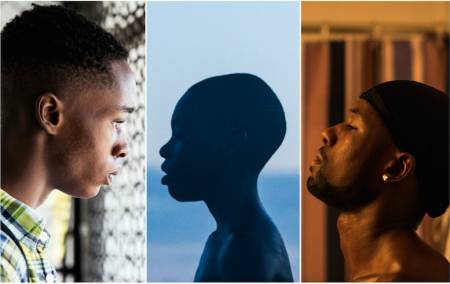
ASHTON SAUNDERS, ALLEX HIBBERT, TREVANTE RHODES (LITTLE, CHIRON, BLACK)
Blackness and gayness
In Moonlight, a movie set in south Florida, Barry Jenkins has made a humdinger of a sophomore feature eight years after his debut Medicine for Melancholy. The latter, very ruminative, urban, and middle class black, was surprisingly original and intelligent, though I quoted Karina Longworth's comment: "Medicine for Melancholy offers a self-contained rebuttal to claims that precious, naturalistic dramas about the existential dilemmas of hipster singles are exclusively a white man’s game." It takes place in San Francisco, by the way. Well, forget all that. Moonlight is visceral and intense and very black. It shows a boy who grows up in the depths of the ghetto with a crack whore mamma and a drug dealer de facto foster daddy, and can still be gay. Maybe everybody knows this, but it's new to the screen, and with this film Barry Jenkins level of accomplishment has made a great leap forward. Moonlight is a deeply original and memorable black gay coming-of-age story.
But it's more complicated than that, because Moonlight focuses on three different intense periods of the young man's life, and he's three distinctly different people (and three different actors). First he's shy, silent ten-year-old "Little." At the next stage he's intense, angry high schooler Chiron. Finally after prison time he's a big muscular brute called Black. He had all these names as a boy but he grows into each of them and each stands for the different person he's become - while he's also all these and other people. He does not know who he is, but whatever he is, is intense.
It's hard to overstate the passion and accomplishment behind the scenes that unfold in this picture, which sometimes feel hurled at you, or hurled across the screen. The language makes no concessions to cliché or to what white people may expect to hear. Some dialogue at least in the third episode is hard to follow and may require repeated viewings.
The story of Moonlight takes place over the course of fifteen years or so, and is based on the playwright and fellow Miamian Tarell Alvin McCraney's short theater piece, "In Moonlight Black Boys Look Blue." There is a poetry and an unmistakably earnest epic quality in the film, with its classical music and James Laxton's elegant Steadicam cinematography which gives even violent, precipitous action a studied look. Rapid camera moves, rapturous moments, bright color, intense pop songs show a clear debt to Wong Kar-wai.* Jenkins and his crew do beautiful things with big old cars, the glint of metal, and water: a great scene is the one in which the boy takes a luxurious ghetto bath using dishwashing liquid and a big tub of boiled water. Camerawork is panoramic, adding sweep to the boy's confinement.
Each manifestation of Little-Chiron-Black also makes no concession to good looks or gay sensitivity, though the small runt of a boy (played by Alex Hibbert with silent composure) and the two other iterations each has an intense, palpable beauty in his blackness that mocks the conventions of commercials and TV casting. Right from the start other boys mark the boy as "soft" and he's chased into a crack house, rescued by Juan (Mahershala Ali), the mentor-to-be who takes him back to his girlfriend Teresa (Janelle Monáe) to get him to talk and becomes his protector. The time will come when he asks Juan what "faggot" means; he gets a kindly, tolerant answer. What the boy has to contend with all the time besides the bullies is his mamma, who keeps descending into drug dependency and scrounging for money, so as a tall, skinny teenager played by Ashton Sanders he tells Juan he "hates" her.
The one he will love-hate is his continuing "friend" Kevin (Jaden Piner at 9; Jharrel Jerome at the crucial moment of 16; André Holland as the adult Black seeks out a decade or more later). These are the moments that are the emotional heart of the film and of Little-Chiron-Black's experience, and though it's not that kind of story or relationship there's the same kind of heartbreaking longing hovering over Kevin as in Brokeback Mountain. Moonlight is another gay tragic epic love story that has the possibility of making its way to a mainstream audience and perhaps even into their hearts, but this time with the addition of blackness. As embodied by Jharrel Jerome, the high school Kevin who is Chiron's only friend and only betrayer, is a weak young man; he will admit to that weakness, to only doing what other people wanted him to do, as a grown man and a cook. But he has one important thing: the ability to reach out and touch Chiron, which makes all the difference. Jerome's weakness is heartbreaking; when he returns as André Holland, he's an eager charmer. His weakness now impresses, and his chattiness may need Black's (like Chiron's, and LIttle's) silence, which may be wounded but is also strong. One of the beautiful moments is when Juan teaches Little to swim; this is a time when we can see his strength, also when the 9-year-old Kevin teaches him to fight back.
When Chiron has returned as Black, and is played by Trevante Rhodes, he's an astonishment. The audience has to accept the transformation isn't what you'd expect, as must Kevin. This final sequence makes sense if you conceive of it as growing from a Brokeback kind of longing and loneliness, and in those terms, it's beautiful, strengthened by the intense presence Trevante Rhodes provides. It's an intensity of blackness, which Jenkins revels in, and Moonlight yields its remarkable pleasures only if we revel in it too. In which case it becomes one of the year's best films.
Moonlight, 110 mins., debuted at Telluride, Sept. 2016; also at Toronto, Edmunton, New York, London, Vancouver, Hamptons, Mill Valley, Rome, Philadelphia, Chicago in close succession, US theatrical realese 21 Oct. 2016.
Last edited by Chris Knipp; 10-11-2016 at 02:24 PM.
-
GRADUATION/BACALAUREAT (Cristian Mungiu 2016)
CRISTIAN MUNGIU: GRADUATION/BACALAUREAT (2016)
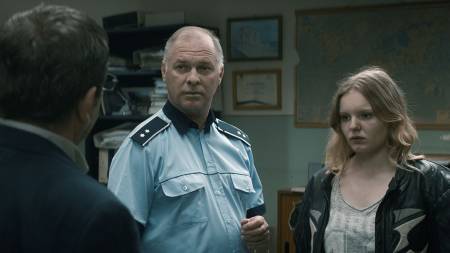
VLAD IVANOV, MARIA DRAGUS IN GRADUATION
Shit hits fan
The doctor protagonist, Romeo (Adrian Titieni) falls into a world of trouble in Cristian Mungiu's new film, Graduation, which centers on his daughter, Eliza (Maria Drǎgus), who's about to take her final exams when she's sexually assaulted by a stranger and breaks her wrist fighting him off. In typical style for Romanian cinema, the film is ferociously unfun, without an ounce of humor. But it enmeshes us in its troubles. The Romanians make films that are like police procedurals that want to be soaps, but are more intricate and patient. Mungiu has written and crafted this film with care, though intentionally paying little attention to arc. Resolution would be a cop-out and dampen down the multivalence of plot too much. So Eliza graduates from high school, but without our learning if she's aced her exams, which Romeo has cared so much about he was willing to throw away his moral reputation to fix the outcome. We don't know if she'll attend university in Cluj with her easygoing jock boyfriend Marius (Rares Andrici) or go to England on a prestigious fellowship at Cambridge as Romeo's been preparing her for her entire life.
Artists aren't always the best judges of what their work is about but Mungiu has been definite that this film is about the age when your best years and your dreams are behind you. This is what Romeo's struggle is about. He's presumably a respected doctor, but there's nothing about his achievements or reputation. He's having an affair with a foreign coworker, Sandra (Mǎlina Manovici), his marriage is on the skids. He tries to belittle the attack on Eliza - tests show she was not technically raped, but when she gets a lower score on her Romanian exam when she needed a 9 or a 10 he persuades a corrupt official to arrange it to be altered. The point is Eliza has become his hope, the dream he lost by choosing to stay in the country, but she's slipping away.
Mungiu is a Cannes darling and hence a director with global cred, having won a Palme d'Or for his corrupt abortionist drama 4 Months, 3 Weeks, And 2 Days nine years ago, as well as lesser but respectable Cannes awards for his 2012 Beyond the Hills and for this new one. But writing from Cannes, Mike D'Angelo (who gave a much more detailed account of the film in his AVClub review than I do here) suggested that this time Mungiu's thinking has lost its urgency. Mike wrote that if he'd seen Graduation a dozen years ago its story of a moral "slippery slope" would have "mightily impressed him" but less so now.
Watching Graduation I felt its source is in the Seventies, in Krzysztof Kieslowski's "Dekalg," the Polish master's series of studies of moral crises encountered in the nightmare of Eastern Europe. Mungiu's work here is serious and absorbing but hasn't Kieslowski's economy or elegance of construction. As I say, the Romanians almost seem to eschew construction altogether. What they excel at is providing endless poignant details of the long littleness of former Soviet Union life. Maybe my favorite Romanian film was really the first I saw, at the 2005 New York Film Festival, Cristi Puiu's The Death of Mr. Lazarescu. It's a film that just goes on and on and on, till it ends. But it is a dazzling as well as numbing illustration of bureaucratic incompetence and corruption with fatal results. The action is mundane, but urgent, and in the end, the title comes true.
But if Mungiu is playing with corruption, and yet it's not his main subject, that's confusing. And in his discussion of the film at a NYFF Q&A he suggested audiences have seemed confused about what it's about. Is Romania getting more honest? Is what Eliza tells her father at the end a sign of improved morals, or cheating in new, or even more old-fashioned ways? Graduation is heartfelt material that provides much food for thought, but it is neither as artistically satisfying nor as intellectually coherent as it might be.
Graduation/Bacalaureat, 128 mins., debuted at Cannes May 2016, showing at at least 15 international festivals, including the New York Film Festival, where it was screened for this review. US theatrical release by Sundance Selects coming in NYC 7 April 2017, followed by a national rollout.

Cristian Mungiu @ NYFF
Q&A 11 Oct. 2016
Last edited by Chris Knipp; 03-14-2017 at 09:49 AM.
-
NERUDA (Pablo Larraín 2016)
PABLO LARRAÍN: NERUDA (2016)
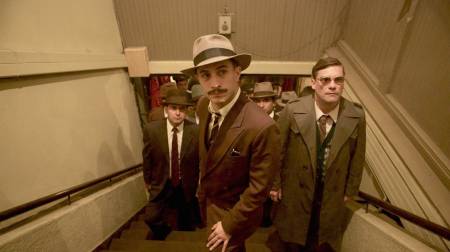
GARCÍA BERNAL IN NERUDA
Larraín's metafictional tale of the famous fugitive poet and his unknown usurper
The Chilean filmmaker Pablo Larraín built a career out of depicting his country's dark time in the Pinochet dictatorship, into which he was born and lived most of his teens. Allende was killed and Pinochet took over in 1973 and reigned till 1990; Larraín was born in 1976. Best are Tony Manero (2008), technically Larraín's second film, and Post Mortem (2010), both starring great Chilean actor and man of the theater Alfredo Castro. Castro made these two pictures, singlehandedly defining Larraín's picture of the slime and gloom of the regime. They're simple, low-keyed films. And they're great.
Something more positive and diffuse came next in the director's 2012 No, featuring Gael García Bernal as an ad man whose publicity campaign was instrumental in PInochet's losing a plebiscite and giving up power. With The Club (2015) Larraín returned to creepiness in a vaguely contemporary depiction of corruption and repression in the Catholic church.
Larraín is busy and productive. No and his latest film, Neruda, are more elaborate productions. But the truth is nothing he has done has the authority and originality of Tony Manero and Post Morten. Granted the energy of its surreal visuals and many tableaux, Neruda, a grand and glossy metafictional phantasmagoria about the famous Chilean communist poet on the run, is on the overblown and repetitious side. The same formulas and the same lines of poetry ring out over and over. Neruda's ambitious but ineffectual young police nemesis Óscar Peluchonneau is played by Garcia Bernal. His perhaps imaginary presence and his tiresomely insistent voice-overs take over the screen from Luis Gnecco as Neruda, a less interesting actor than Alfredo Castro, the poet coming off as a blowhard.
But he is an audacious one, certainly, whose following among vast elements of the general public is made clear. This Neruda is many people, poet and senator, loving husband, "bigamist" (since he has a foreign first wife who's dredged up unsuccessfully by the government) and denizen of brothels. This links him with Peluchonneau, who is or imagines himself to be the illegitimate but ultimately acknowledged son of the founder of the police department, represented by a giant-sized statue, by a woman who worked in a brothel for thirty years. Peluchonneau keeps repeating that he is not a supporting player. (Vadim Repin has suggested that Peluchenneau is in a love-hate relationship with his prey just as Larrín is with Pinochet, whose regime has been so fruitful for his work.) And this is another uncertainty of the film, an intriguing one: who is the protagonist, the pursuer or the pursued, the great poet fleeing over the Andes into lifetime exile, or the nonentity who narrates the film and seeks to become its protagonist? García Bernal is the internationally famous artist, of course, so for non-Chilean audiences his character attracts more attention.
The film has gotten raves in festival showings. Typical of those is the reaction of Justin Chang in a Toronto roundup for Variety, calling it "the most inventive, freewheeling movie about an artist since Todd Haynes' 'I'm Not There.'" Critics like that it's not "an ordinary biopic" but instead (in Chang's words) "a richly inventive fantasia on the poet's themes." What are "the poet's themes," though? The phrase is troublingly vague. Departing from history and seeking a historical figure's "essence" is doubtless welcome; we're all tired of conventional biopics. But for all the cinematic flourishes, it doesn't work here. Maybe Neruda is a grand and epic failure, but it's a failure for sure - one that wears out its welcome early on. For all its fantasies and changes rung on the actual life of its subject, Neruda looks more like a conventional big budget picture than anything Larraín has done up till now.
The fundamental problem is an uncertainty of tone. From the start, a (typically) elaborate scene in which Neruda and the President of Chile trade insults, in a set that seems part seat of government, part urinal, proceedings seem the have more than an edge of satire, but to also be pretty serious. It looks like Neruda is about to get into bad trouble. This becomes more problematic for the gringo viewer whose knowledge of the history is limited. We can understand the Seventies. Dictatorship is an easy thing to grasp. But these are the Forties (signaled more by the cars than anything else), and we don't know what was going on in Chile then. Neruda boasts of being a communist - the thing that's going to lead to orders for his arrest (and the real or imaginary Óscar Peluchonneau's setting out to find him). But at the same time he doesn't seem to take being a communist seriously.
I do like the idea of this relationship between a noble victim and García Bernal's dapper little mustachioed martinet of a cop who keeps almost finding him, and ends falling down in the snows of the Andes. These scenes and many others are gorgeously photographed: snow has rarely looked prettier. The mock-serious, deadly dangerous yet laughable, setup is one that Nabokov used in a number of his novels, and I can best understand what Larraín was trying to do by seeing this as a Nabokovian tragicomedy. I also liked seeing pretty-boy García Bernal play a more mature, and less flattering, role. Peluchonneau's's lonely scenes are in stark contrast to the more cluttered sequences involving Neruda and entourage, as they must since the two men never come directly into contact.
Neruda, 107 mins., debuted at Cannes Directors Fortnight May 2016; at least 14 other international festivals including Telluride, Toronto, New York and Mill Valley. It is to be Chile's entry in the Best Foreign Oscar competition. US theatrical release to begin 16 Dec. 2016. In NYC at the Film Society at Lincoln Center and IFC Center.
Last edited by Chris Knipp; 12-15-2016 at 12:46 PM.
-
STAYING VERTICAL/RESTER VERTICAL (Alain Guiraudie 2016)
ALAIN GUIRAUDIE: STAYING VERTICAL/RESTER VERTICAL (2016)

DAMIEN BONNARD AND INDIA HAIR IN STAYING VERTICAL
Country life
Gay-oriented French director Alain Guiraudie, whose Stranger by the Lake/L'inconnu du lac in Un Certain Regard at Cannes in 2013 won him a lot of prizes, made it for the first time into Cannes Competition with this year's Staying Vertical/Rester vertical. Having seen only his last two features (he's made eight) I can hardly generalize, but the New York Film Festival Q&A brought out that Guiraudie often makes a new film that contrasts with the last. Staying Vertical's changes of location and wild unpredictability are indeed in sharp contrast with Stranger by the Lake's tight police procedural structure and strict limitations of time and place. The last film could be seen as a grimly realistic critique of cold gay sex. The new film is notable for its comically free-flowing sexuality. It also has an element of the surreal and of fable, and a mythological beast, the wolf, which may have its parallels in the male cast members.
Vertical's narrative follows its strapping main character Leo (Damien Bonnard), a screenwriter wandering homeless around southern France in his Renault. He keeps asking his producer (Sébastien Novac) to wire him 3,000 euro advances, but he hasn't written a line. He meets a feisty young shepherdess called Marie (India Hair) and they have tender (and realistic) sex and a baby is born (fast forward, obviously, and also realistic). Guiraudie handles the impulsive and natural sex very casually. Marie has post-partum depression and runs off to town with her two young sons, leaving Leo with the baby. Leo also has to contend with Marie's ogreish father Jean-Louis (Raphaël Thiéry), who seems to be dangerous, and also predatory. And from the start he has kept coming back to an old man by the roadside, Marcel (Christian Bouillette), for whom age has never lessened his pleasure in Pink Floyd played at top volume, who slings homophobic abuse upon the pretty young man who lives with him, Yoan (Basile Meilleurat), whom Leo propositions, but who has no use for Leo. Leo goes repeatedly for some kind of plant therapy in a swamp, just as he keeps going back to Marcel and looking for Yoan. He takes care of the baby, but this becomes increasingly shaky as he runs out of money and is attacked by homeless people and left naked. He is fascinated by wolves, who are a real menace in France these days. At one point Jean-Louis uses the baby as a bait for them.
As D'Angelo writes in his Cannes report for AVClub, Guiraudie makes all this outrageous stuff work through rhythmical repetition, and there is a tonic quality about the flow of freedom and responsibility. This film neatly skates the line between what could make you cry and what could make you laugh, though in the Q&A the director said he'd have liked to have achieved that to a greater extent and will strive to in future. One of the jokes is how Guiraudie reuses existing characters for new functions instead of introducing new ones. It's a process film and the process is Leo's gradual decline, but at the end in a stunning final scene it seems Leo has been transformed and elevated into a shepherd and saintly wolf whisperer. But apart from anything that happens the pleasure of the film is its continual sense of unpredictability, hovering between tragic and comic, and its country earthiness, the directness of its passions. Guiraudie grew up in a farming family, according to French Wikepedia, and in the Department of Aveyron where much of this film takes place. One might think of Bruno Dumont for the brutal bluntness of the sex, but this is sweeter. Not for everyone, but a great palate-cleanser for the cinephile who's been watching more conventional festival entries like Neruda and Graduation.
Staying Vertical/Rester vertical, 100 mins, debuted at Cannes May 2016 in Competition. Ten other festivals including London and New York in October. Screened for this review as part of the New York Film Festival. US theatrical release by Strand Releasing coming in LA on 20 Jan. 2017 at Laemmle's Royal Theatre and in NYC 27 Jan. 2017 at Film Society of Lincoln Center and the IFC Center.

Alain Guiraudie @ NYFF (CK photo)
Q&A 12 Oct. 2016.
Last edited by Chris Knipp; 12-20-2016 at 06:49 PM.
-
THINGS TO COME/L'AVENIR (Mia Hansen-Løve 2016)
MIA HANSEN-LØVE: THINGS TO COME/L'AVENIR (2016)
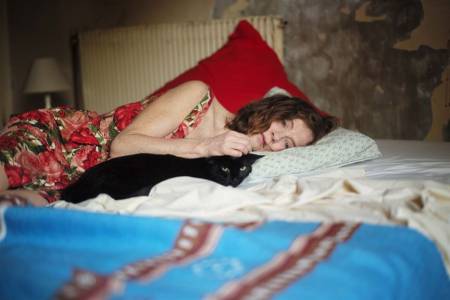
ISABELLE HUPPERT IN THINGS TO COME
Embracing life's hard knocks
In Hansen-Løve's Things to Come/L'Avenir, a film designed with Isabelle Huppert in mind, her character Nathalie, a fiftyish Paris professeur agrégée of philosophy, faces one challenge after another with the kind of aplomb only the seemingly indestructible Huppert can carry off. It's summer, and a lot of the action takes place in northeastern Paris around the sunny Buttes Chaumont. Braving political strikes against government rises in retirement age is the first, and mildest, of her worries. Her husband Heinz (André Marcon), also a prof of "philo," is leaving her for a mistress. Her publisher is dropping her. Her daughter is leaving the nest. Her favorite graduate, a dreamboat, and someone she's probably in love with, Fabien (Roman Kolinka), is moving to a remote leftist commune whose denizens mostly speak German, which she doesn't. Most urgently, her aging mother (iconic actress Édith Scob) is having daily panic attacks and threatening suicide; the firemen are called in every day. Nathalie is saddled with her mother's overweight cat, Pandora, and she's allergic.
This is, in Mia Hansen-Løve's distinctive manner, a realistic "comédie de moeurs" that takes some jumps through time, and hits upon life crises with naturalism, style, and a moral seriousness that yet manages a light touch. Nathalie declares to Fabien that losing her mother, her husband, her daughter, her publisher, she has never been so free, and it's wonderful. One admires her panache. But does one believe her? She collapses in tears more than once.
An awful lot happens in under an hour of this 102 minute film, delivered with such rigorous French elegance, so cooly acted by Huppert, that it's a little hard to take it all in. On the one hand this has been called "the richest" of Hansen-Løve's five features, maybe because the protagonist is going through a classic series of major post-midlife crises. Her other films are more limited in focus, the addict parent of Tout est pardonné , the tragic film benefactor whose suicide leaves his family in the lurch of The Father of My Children, the young couple who part before the girl would like of Goodbye First Love, the music impresario brother with drug issues of Eden. But these also arguably are more particular, less schematic, than the latest film.
Fans of the Coen brothers' Inside Llewyn Davis will note that here too, a protagonist adrift is saddled with a cat. It's her panic at Pandora's temporary disappearance when Nathalie lets her loose at Fabien's country place that shows the disquiet under her façade of outward calm and assurance. One is also reminded as the plot unfolds of the line spoken by Bodhi in Point Break: "Life sure has a sick sense of humor, doesn't it?"
I was not so moved by Things to Come as by the director's previous films (except for Eden, which seemed a little too spread out and panoramic), but a friend whose opinions I respect declared that she "loved, loved, loved" it, and it just may take more time to sink in; this was true for me of Tout est pardonné. An angle to reconsider is how well Nathalie's "philo" instruction works for her, whether there is an ironic disconnect between text and life (as Nathalie's text books are declared defunct), or au contraire her conduct - something Isabelle Huppert, past 60 but still beautiful, elegant, and girlish, can carry off - may truly reflect the heroism life requires of us on a daily basis.
Things to Come/L'Avenir, 104 mins., debuted at the Berlinale, winning the Silver Bear for Best Director and nominated for the Golden Bear for Best Film. French theatrical release 6 Apr. 2016, to very strong reviews (AlloCiné press rating 3.9/27 critics). Shown at nearly two dozen other international festivals including the New York Film Festival, where it was screened for this review 14 Oct. 2016.
US limited theatrical release begins 2 Dec. 2016.
Last edited by Chris Knipp; 11-29-2016 at 09:14 PM.
-
ELLE (Paul Verhoeven 2016)
PAUL VERHOEVEN: ELLE (2016)
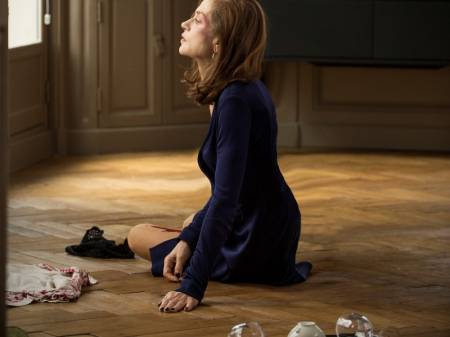
ISABELLE HUPPERT IN ELLE
My rapist
It is a uniquely disorienting and confusing pleasure to watch Isabelle's two latest movies - Mia Hansen-Løve's Things to Come/L'Avenir and Paul Verhoeven's Elle - one after another, as I just did in New York. Both were playing in the city's premier annual cinematic event, the New York Film Festival. Some young journos who slogged through them with me joked that if neither one quite was a great film, a mashup of the two might be a zinger. Actually either one of them is a zinger by itself. Isabelle Huppert is simply an amazing actress, the most prolific and quite possibly the most brilliant in movies today.
In the first, Huppert plays Nathalie, a Paris university "philo" prof, who's more or less an ordinary human being, though exceptional in her aplomb in the face of hard knocks. She is dumped by her academic publisher and her longtime husband; left in the lurch by her handsome favorite student; faced with her mother's dramatic aging and death, her daughter's leaving the nest, becoming a grandmother, and rescuing a cat.
In the second, Verhoeven's Elle, Huppert plays Michèle Leblanc, the owner-manager of a successful video game company with a very, very strange past and an equally weird present. She's not really remotely a normal human. She's an Isabelle Huppert superwoman-monster. This is a mystery, a comedy, and a horror movie. It also confusingly meshes with the previous film. Here too she becomes a grandmother, must contend with a trying aging mother. And in both there is a cat, and the Huppert protagonist weathers a series of literally very hard knocks with, well, this time, super-human aplomb.
Verhoeven hasn't made a movie for a decade and this is his first made in France. It happened because Huppert latched onto the project before Verhoeven did, and Hollywood rejected it, after American David Birke had adapted Philippe Djian's French novel for the screen. The rejection, Verhoeven has explained, was because in Hollywood, if a woman gets raped and pursues the rapist, there's got to be revenge. But there was no revenge in the book, or Birke's screenplay. Instead, the raped lady, a successful businesswoman of unsinkable froideur, gets involved in a tricky game of cat and mouse with the rapist. The "mystery" soon ends, though, as she discovers the rapist (Laurent Lafitte) close at hand - but does nothing to have him apprehended.
Michèle Leblanc gets raped in the first frames, by a tall masked man in black (we'll revisit this scene again, and again). They fight, violent blows are exchanged, a table full of china crashes onto the floor of Michèle's suburban mansion. Violent intercourse occurs, with panting and yelling. The masked man flees. Michèle then gets herself up, and sweeps away the mess. She tells her boyfriend the big bruise on her face is from a fall off her bike. She goes about her business. It's only later she tells friends and family she was assaulted. She does not tell the police. This is because she does not like police, for reasons we learn later.
Elle seems trashy, but Verhoeven's movies always do, even at their best, and this time it's trash with an elegant French gloss. The mixture of violence and blood and murder in a bourgeois French setting reminded me of Chabrol; and, of course, Huppert worked for Chabrol - six times. Even Chabrol would probably not have filmed a story with trappings as lurid as these. Michèle's mother (Judith Magre) is a disgusting old crone, her face a bumpy mélange of crude cosmetic surgeries and with the occasional "petit botox." She has a paid muscular young lover called Ralf (Raphaël Lenglet). Her father is in prison for life for a series of lurid murders when Michèle was a girl - and may have participated.
The video games Michèle's company makes are lurid, sexual, and violent too, and the company is mostly cocky young men, who mock her. There is a version of the latest game mocked up to amuse the team in which Michèle is sodomized by a tentacled digital monster. There are other subplots. Michèle has a lover (Christian Berkel), who is the husband of her best friend (Anne Consigny), and her ex-husband (Charles Berling) is still in the picture. She has a strapping young doofus of a son called Vincent (Jonas Bloquet), who's expecting to have a baby with his girlfriend, Rebecca (Virginie Efira), who's crazy; the baby clearly is not his, and the father is black. Yet Michèle considers herself a grandmother. Her parents do not fare well. The protagonist masturbates watching her rapist, and a Christmas crèche; religion provides more than one form of conciliation. Some of this stuff would get in the way of a Chabrol plot, but it's all grist to Verhoeven's energetic gin mill.
Half the pleasure of Elle is seeing Huppert sail through the turbulent, convoluted action. Michèle Leblanc was a character she had to play. Elle has an excellent cast with plenty of depth, but it is Huppert who makes it work. She is indestructible. We don't really know who Michèle Leblanc is or what makes her tick, but with Huppert, it can happen. This movie is another expansion of the repertoire of the inexhaustible actress, and as noted in a NY Times article, writer "have noted that Elle includes sly references to her formidable filmography, including Michael Haneke’s The Piano Teacher (2002); Christophe Honoré’s My Mother (2004), a story of incest; and Claude Chabrol’s Madame Bovary (1991)."
No doubt Huppert has been through many vicissitudes on film, but Elle reminded me of Catherine Breillat's bravely honest autobiographical film, Abuse of Weakness, in which Huppert also stared, and was brilliant and convincing. It depicts how Breillat had a stroke, and the disreputable man who became her "helper" took over her life, and her bank account, wiping her out financially. Here too, the Huppert character is Teflon-coated, knocked down, but unbowed. That was real life. Elle is ghastly fun.
Elle, 130 mins., debuted at Cannes in Competition May 2016 and was nominated for the Palme d'Or; 20 other festivals, including New York, where it was screened for this review 14 Oct. 2016. Released theatrically in France 25 May 2016, it received raves (AlloCiné 4.4/37 reviews). US theatrical release 11 Nov. (English-language reviews ecstatic: Metacritic score 90; UK release coming 24 Feb. 2017.
Last edited by Chris Knipp; 11-13-2016 at 01:41 PM.
 Posting Permissions
Posting Permissions
- You may not post new threads
- You may not post replies
- You may not post attachments
- You may not edit your posts
-
Forum Rules





 Reply With Quote
Reply With Quote








Bookmarks